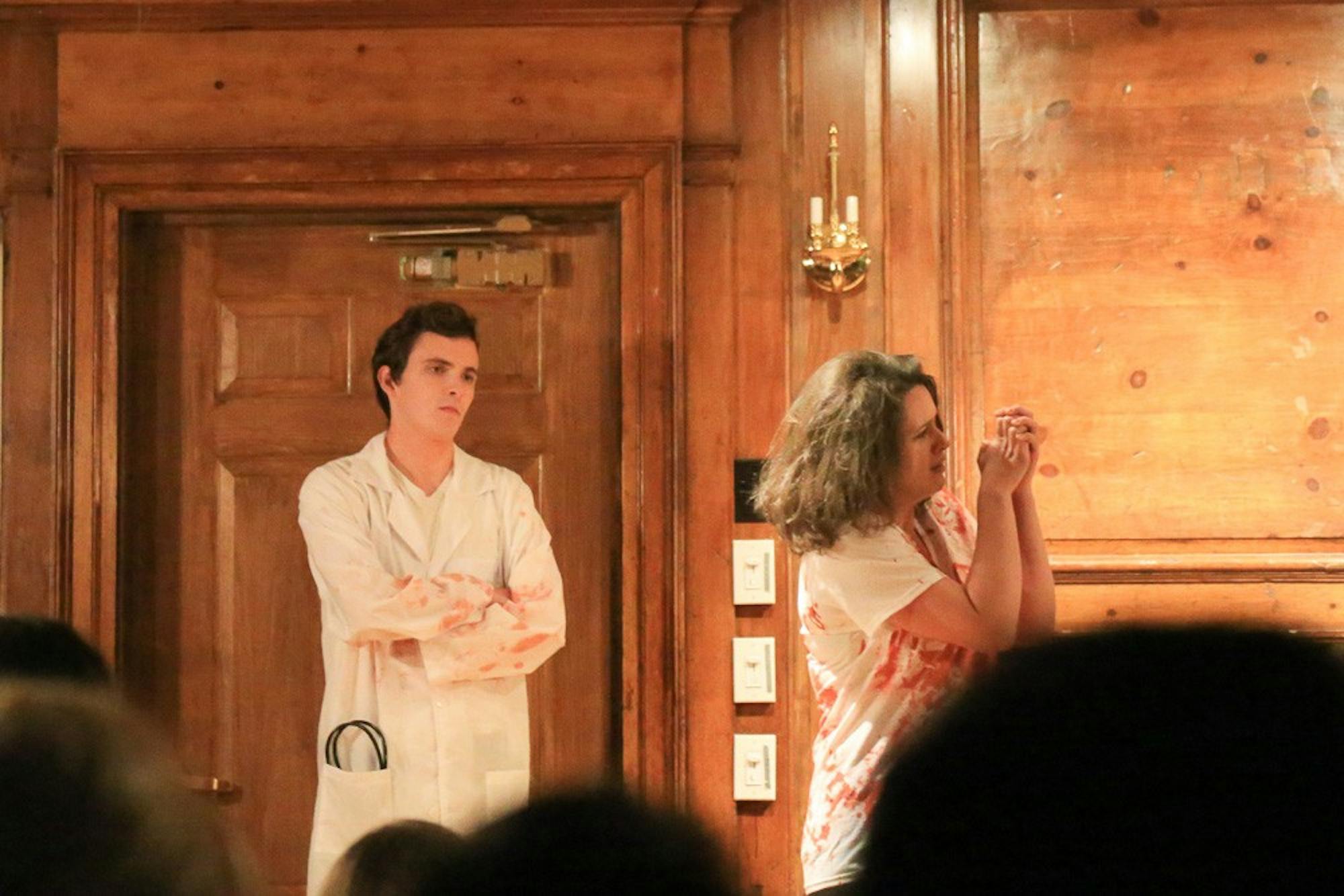The Rude Mechanicals began its rendition of “Macbeth” on Halloween night with swords clashing and witches raving. The student group, which runs one Shakespearean play per term, produced a shortened version of the famous Scottish tragedy on Thursday and Friday.
The troupe staged the performance on the first floor of Beta Alpha Omega fraternity, playing for an audience seated in a comfortable assortment of couches and chairs. The dark paneled walls and formal fireplace suited the play’s brooding and ominous tone, and the two doors flanking center stage allowed for quick, easy exits to a backstage area for the cast.
Executive director Steph Abbott-Grobicki ’15 played the dynamic role of Lady Macbeth, evoking her descent into madness with engaging monologues that captivated the audience. Partnered with her Macbeth, Avery Feingold ’17, Abbott-Grobicki created vibrant scenes that demonstrated the complicated nature of her character, who cajoled and controlled her vulnerable husband with ease. The couple’s palpable chemistry made their scenes stand out despite their comparative lack of physical action.
Feingold said he used the literature for inspiration and infused the character with relevant pieces of his own personality. Used to playing comedic roles, Feingold said he worked to control his voice and make his fear believable rather than laughable. When the ghost of the murdered Banquo appeared before him, Feingold’s screams and terror showed that his efforts paid off.
Artistic director Mike McDavid ’15 said he had been pushing to do “Macbeth” for much of his three years with the group. In addition to playing the role of Macduff, McDavid cut the script to a running time of around 75 minutes.
The play, McDavid said, has “many rich themes.”
“It’s constantly coming back to ideas of violence and deception, action versus speech,” he said, “And every character is touched by these ideas throughout the play.”
McDavid said that cutting a Shakespearean script can be difficult, but he had a clear vision for the piece.
Abbott-Grobicki said that performing in a fraternity had been in the works for a while, but logistically had proven too complicated to arrange. Audience member Calin Ackerman ’17 said that the actors made “great use of the space” by playing with lighting and using few physical set pieces.
The company wore simple costumes: dark bottoms and crisp white T-shirts. As the play progressed, the clothing became stained with blood from murders, fights and discoveries. The violent image was juxtaposed with the characters’ attempts to conduct normal behavior and hide their involvement in brutal crimes, creating dramatic irony.
“I thought that our visuals were very effective,” McDavid said. “I think we were taking a risk, asking the audience to come with us with this idea that the blood is and is not there, that what you’re seeing is and is not what you’re really seeing.”
The image of Macbeth drenched with blood — and that he never changed costumes — made a big impact, audience member Nick Jensen ’15 said.
The performance’s ending featured a twist of the traditional Shakespearean conclusion. While the text ends the play with a conservative speech by Malcolm, this version concluded with the witches re-emerging — the lights dimmed as they repeated their ominous curses. This effect left the audience with an eerie feeling, exacerbated by the disorientation of the darkness.
McDavid said that the group collaborated to imagine the ending, working up until the week before to generate ideas and workshop them.
“For us, we realized that regardless of what [Shakespeare] was going for, we wanted to punctuate our play,” McDavid said. “We wanted to leave the audience with a sense that this story is done, but the themes aren’t over — that there is more to come.”
McDavid is a member of The Dartmouth opinion staff.




